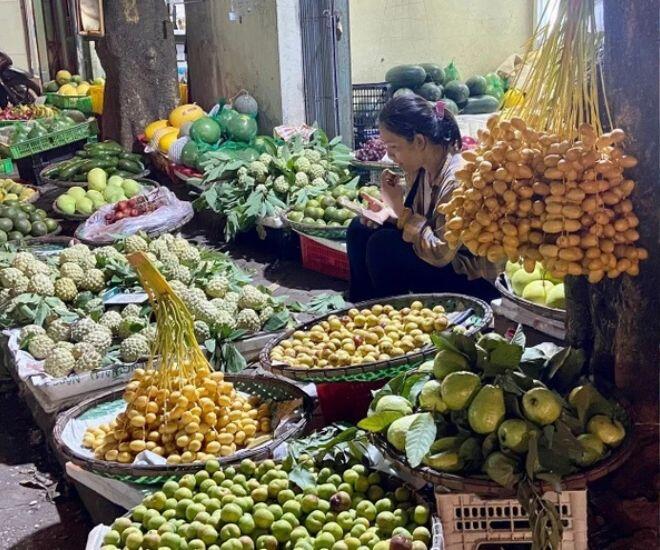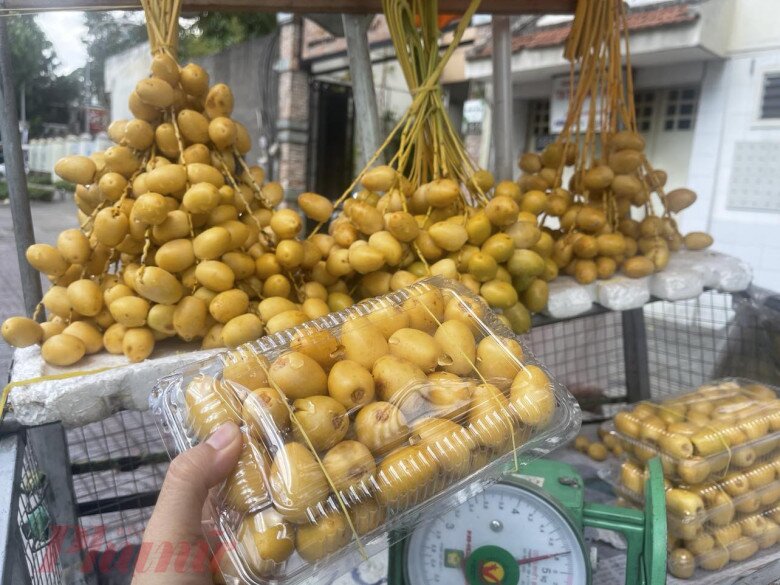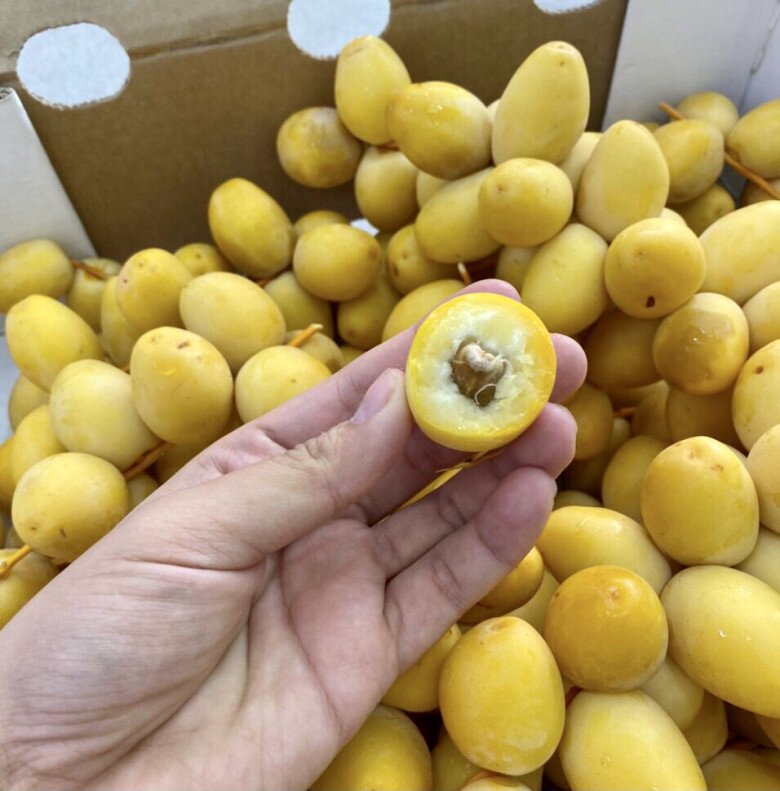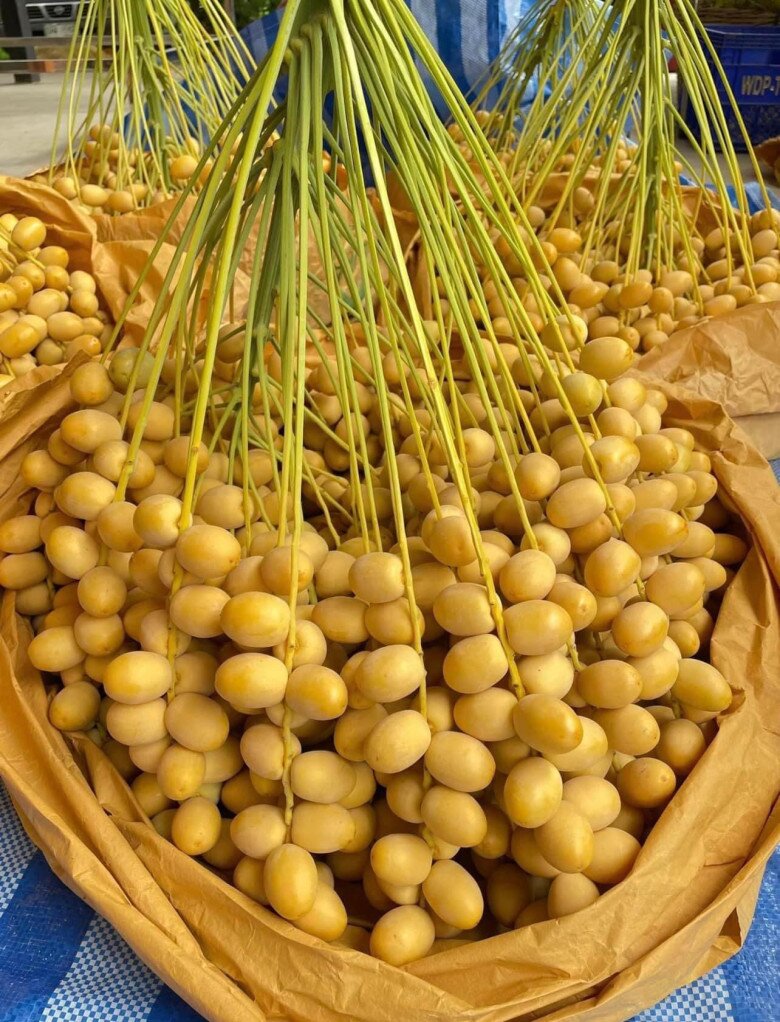
Previously, fresh dates on the branch were known to be an expensive imported fruit, often categorized as a “delicacy” or a “luxury fruit.” With prices ranging from 200,000 to 300,000 VND per kg, even reaching 600,000 VND per kg at times, many were hesitant to indulge in this treat. However, this year, with increased production and supply from Thailand, date prices have dropped significantly. Numerous traders at wholesale markets in Hanoi confirm that the volume of imported Thai dates has increased considerably compared to previous years, leading to unprecedented price reductions.
At imported fruit shops on To Hieu Street in Ha Dong, fresh dates are now offered at approximately 79,000 VND per kg. Similarly, at Dich Vong Market in Cau Giay, the price of fresh dates on the branch ranges from 120,000 to 150,000 VND per kg. These prices are considered quite reasonable compared to other imported fruits such as American grapes, Australian cherries, or New Zealand apples.

The influx of fresh Thai dates not only makes them more affordable but also diversifies the types of dates available in the Vietnamese market. Currently, there are mainly two varieties of fresh dates on offer: red dates and golden dates, sourced from Thailand or Middle Eastern countries such as Egypt and Namibia. Thai fresh dates tend to be of medium size, with an attractive golden color, and offer a sweet taste with a slight astringent note from the skin. This variety is perfect for eating fresh, providing a crisp bite and lingering sweetness. In contrast, dates imported from the Middle East are typically sold as soft ripe or dried fruits, with a more intense sweetness and significantly higher prices.
The quality of Thai fresh dates this year is considered excellent, benefiting from favorable weather conditions that ensured perfect ripeness and sweetness. The date fever has sparked mixed reactions from consumers. Some express a particular fondness for this fruit due to its refreshing flavor, unique taste, and crisp texture. They are willing to spend more on this novel fruit, despite its higher price compared to domestic produce. However, others feel that the taste of fresh dates does not justify the cost. The slight astringency of the skin may also be off-putting to some palates. Nonetheless, the popularity of fresh dates shows no signs of waning, especially with the widespread promotion on social media, fueling the “try-it-out” and trend-following mentality.

According to experts, the significant drop in date prices this year could be a positive sign for the imported fruit market. When a once-luxurious fruit becomes more accessible, it expands the potential customer base, stimulating consumption. This also demonstrates the adaptability of suppliers, who can adjust supply and pricing to match consumer preferences and purchasing power. Competitive pricing will encourage importers to seek out better-quality sources at reasonable prices, benefiting both sellers and buyers in the long term.
However, alongside these positives, consumers should exercise caution when purchasing fresh dates. Currently, dates are widely available on online markets at varying prices, ranging from 115,000 to 200,000 VND per kg, with some “premium” selections exceeding 300,000 VND per kg. These price differences may reflect variations in quality, origin, and seller reliability. Therefore, consumers are advised to buy from reputable fruit shops and stalls to ensure product quality and food safety. While Thai fresh dates are generally of good quality, thorough inspections before purchase are necessary to avoid subpar products that do not match their price tag.

From a fruit reserved for the upper echelon, fresh dates have swiftly become a familiar street snack, opening new opportunities for businesses and offering diverse culinary experiences to consumers.






























